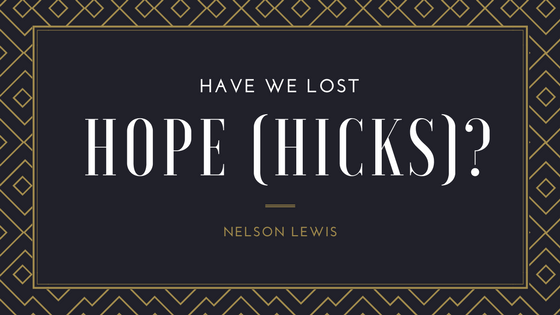Who the heck is Hope Hicks? Before last month, I’d never heard of her – and by all rights, I had no reason to. Despite being one of the most-trusted voices in Trump’s inner circle, the 29-year-old communications advisor has by and large flown under the media machine’s radar. For the majority of the president’s first year in office, Hicks has broken from her colleagues by standing in the metaphorical shadows and refusing both print and televised interview opportunities. With a dearth of readily-available material, the lion’s share of media attention has centered on…Hick’s fashionable wardrobe. Honestly, who cares if she wore a tuxedo and pink lipstick to a state banquet in Japan? Is that really what we want to focus on in politics these days?
Clearly not. With the not-so-notable exception of the fashion mags, Hope Hicks has stayed out of the spotlight and left the on-air work to her colleagues and – more significantly – to the president himself. Hick’s relatively quiet approach has protected her from the high-profile purges experienced by other members of the senior staff (i.e., Sean Spicer, Steve Bannon, Reince Priebus, and Hick’s own disgraced ex, Rob Porter). As a writer for Politico puts it: “She has accepted that he will say things that people find shocking, or upsetting — but she long ago made the decision that she deeply believes in Trump as a leader, and that she wasn’t going to change or judge a 70-year-old man whose career highs have been based on trusting his own instincts.” Some might see this acceptance as indicative of loyal service, but others believe her decision to stand back in silence constitutes a failure to do her job. As one former GOP Hill aide commented in a recent article, “[Advisors] exist […] to improve otherwise difficult situations. The fact that people around him are not trying to protect the president blows my mind at this level of politics.” Within this line of logic, Hope Hicks should be taking a more active role by corralling President Trump during interviews and intervening before the media train ever flies off of the rails.
But let’s back up for a moment. First, those involved in media interviews with the president have noted that Hicks does interject during potentially troublesome segments; her comments are simply off the record. Secondly, Hicks isn’t trying to “rein in” or cut off the president in a public setting – he’s the president! Her job is to provide media strategy advice to President Trump; whether he takes it is entirely up to him. Some might say that this interpretation flies in the face of how the job has been enacted in the past and that Hicks is responsible for controlling the president’s public image. But what these critics forget is that Trump’s isn’t the typical presidency. The president’s supporters love that Trump doesn’t analyze every word for its political impact or engineer his communications to fulfill an agenda as run-of-the-mill politicians do. During Obama’s presidency, every speech and public appearance was cooked by the communications department to skew public opinion in favor of the administration’s latest political plot. But that kind of backroom manipulation and prebaked communication strategy simply doesn’t work, because Trump himself can’t be shoehorned into adhering to old political expectation of how an administration should run. Attempting to cut him off or rein his comments in only guarantees one outcome: a short career and a quick firing. Hope Hicks can’t be painted as an inattentive or ineffective aide when she’s so clearly a savvy navigator within the Trump administration’s political waters.
In a way, this colors the news of Hick’s recent exit from the White House. The fact that Hicks is leaving gracefully – and with the President’s regretful blessing – speaks volumes of how her quiet approach to navigating Trump’s office fostered enormous goodwill in the administration. The move apparently took most staff members by surprise, as she was still on seemingly excellent terms with the president and senior operatives even after the media storm involving her former partner and ex-staff secretary Rob Porter. Hicks’ decision to leave was a personal one, and as such should be respected. That said, I can’t help but think that she would have remained at the President’s ear and and continued to exercise her soft-spoken influence long after her high-profile political colleagues have fallen from grace had the circumstances not been so toxic to her personal life.

